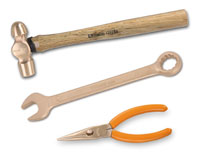
The ATEX 137 Directive 99/92/EC (European equivalent to the US OSHA "HAZLOC" standard) defines types, or Zones, of explosion risks in the workplace. It also outlines requirements for minimizing the risk of ignition in these potentially explosive environmets. For example, tools used in these Zones must not give off sparks if accidentally dropped on a concrete floor.
The Beta Tools line of sparkproof tools are manufactured of a special copper-beryllium alloy (Cu-Be) to meet 99/92/EC. Beta sparkproof tools are certified by BAM (independent German testing labs) to meet the ATEX requirements for use in the most hazardous Zones 0 and 20.
| Classification of Areas Subject to Explosion Risk | |||
|---|---|---|---|
| ATEX | High | Medium-Low | Extremely Low |
| Gases | Zone 0 | Zone 1 | Zone 2 |
| An area in which an explosive atmosphere consisting of a mixture of air and flammable substances in the form of gas, vapour or mist is continuously present or present for long periods or frequently. | An area in which an explosive atmosphere consisting of a mixture of air and flammable substances in the form of gas, vapour or mist is likely to occur in normal operation. | An area in which an explosive atmosphere consisting of a mixture of air and flammable substances in the form of gas, vapour or mist is not likely to occur in normal operation but, if it does occur, will persist for a short period only. | |
| Dusts | Zone 20 | Zone 21 | Zone 22 |
| An area in which an explosive atmosphere in the form of a cloud of combustible dust in air is continuously present or present for long periods or frequently. | An area in which an explosive atmosphere in the form of a cloud of combustible dust in air is likely to occur in normal operation occasionally. | An area in which an explosive atmosphere in the form of a cloud of combustible dust in air is not likely to occur in normal operation but, if it does occur, will persist for a short period only. | |
Cu-Be alloy is also antimagnetic and corrosion-resistant, but its mechanical characteristics are different than those of steel. You must take care not to abuse or overload the tool.
| Beta Tools Cu-Be Alloy | |
|---|---|
| Composition | |
| Beryllium (Be) | 1.8 to 2.3% |
| Cobalt/Nickel (Co + Ni) | 0.2% Minimum |
| Cobalt/Nickel/Iron (Co + Ni + Fe) | 1.2% Maximum |
| Copper (Cu) | Remainder |
| Mechanical Properties | |
| Hardness | 310 to 360 Brinnell / 33 to 39 Rockwell C |
| Tensile Strength | 1050 to 1200 N/mm2 / 152,289 to 174,000 psi |
| Yield Point | 840 to 880 N/mm2 / 121,831 to 127,633 psi |


